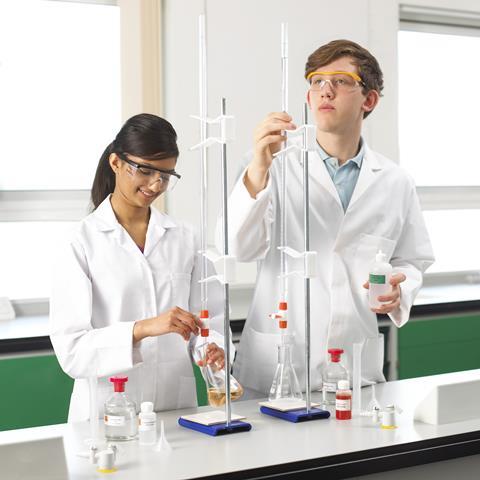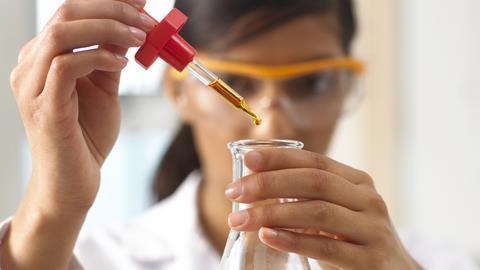Practical work in the final years of secondary school study requires students to develop their hands-on and minds-on skills
Students choosing to study chemistry post-16 face challenges in developing the skills they need for practical work. And meeting those challenges can depend as much on whether teachers have the time and resources to carry out experimental work, as on grasping more complex concepts.
Practical skills are assessed differently across the UK and Ireland, but the opportunity to practise some basic skills prior to senior study seems to be a common issue.
Building practical skills
In Ireland, younger students study science as opposed to individual disciplines so teachers might emphasise different skills. ‘I’d spend a little bit more time going through operations for distillation, as opposed to biologists who maybe take a little bit extra time on understanding the microscope,’ suggests Kim Wright, who teaches chemistry at a community school in County Wicklow.
Her approach is to give students in the senior phase the required equipment and to take them step by step (for example) through a titration process for a 40-minute session. ‘You have to show me that you can manipulate, read, set up and dismantle the equipment before you can actually proceed to titration. And that’s before you get into the nitty-gritty, the actual physical chemistry.
‘I’d say that 40 minutes probably saves me two hours later in the course,’ she adds.
Frances Moloney, a Dublin-based teacher whose pupils are drawn from areas of social disadvantage, finds students need more time to build handling skills. To prepare for teaching students about volumetric analysis, she’ll also spend that time teaching students how to use a pipette and pipette filler accurately to transfer a specific volume of water into a conical flask. Originally, she says, ‘I would have included this at the start of the lesson in which I had intended them to carry out a titration, but because many [pupils] do not do activities to develop manual dexterity (less crafts, more Xbox), I found they needed more time to gain the manipulative skill and build confidence that they had the skill.’ She also tries to establish the notion of consistency of results.
Having their mind on is the biggest challenge
Because her classes are mixed ability, Frances breaks some experiments into several parts – for example the preparation of a soap, ‘so that there’s something for everybody’ and students have longer to digest aspects of the experiment. Irish schools don’t have science technicians, so teachers must make the time to prepare. Frances argues this ‘diminishes the student experience’.
Kim incorporates short ‘flipped’ lessons, where she videos herself doing a practical and then asks students to recreate it when they come into class. It allows for a quick appraisal of ‘where each individual student is at. [It] gives me feedback without them even noticing they’re giving me feedback.’
But if schools don’t have resources or equipment students don’t get enough practice to become confident. For Jurgita Hong, a chemistry teacher at Drummond Community High School in Edinburgh, practicals are key to students’ grasp of new concepts. ‘If we can do a practical, they’re less likely to have misconceptions,’ she says.
John Mullen, at nearby Leith Academy, says it’s a difficult balancing act to get through the volume of material in the new nine-month Higher course – of which he’s a ‘big fan’. ‘Because it’s definitely got nine months’ worth of material in it, you tend to always run into trouble to fit it all in … and you might feel you don’t have time to do as much practical.’ However, much of the practical work is about improving techniques pupils will have encountered before and developing an approach to problem-solving.

Switching minds on
‘In the student’s mind, there is not always the link between the practical activities and theory. They don’t think around the practical – why am I doing it and what do I want to achieve?’ says Ian Davies at Winstanley College in Greater Manchester.
Tim Joliff, who teaches at Queen’s College, an independent school, agrees. ‘Chemistry teachers talk a lot about hands on and minds on, and that, to me – having their mind on – is the biggest challenge.’
He adds that ‘students are notoriously inaccurate with quantitative work – that’s not just [about] manipulating the burette. The biggest factor is they’re not really thinking about where the sources of error creep in, the implication of having an air bubble in the bottom of the burette. They’re so used to virtual things, where, if you press the right button, the result happens on the screen.
‘They haven’t got their minds switched on to those practical considerations.’
Ian suggests pupils just aren’t ‘inquisitive enough. They are too schooled at one factor, one result at GCSE. There’s no nuance, there’s no complexity.’ When there is complexity, ‘they find it very hard to think in those more abstract ways.’
‘We’ve let them follow the recipe and get through the practical and then asked them to do the thinking at the end. And quite often, you want to stop them four or five times while they’re doing the practical and get them to do the thinking as they go along,’ Tim argues.
Developing independence
Because her school is so small, Jurgita juggles the complexities of teaching both Higher and Advanced Higher in the same class. Even in these final years ‘they’re still not very good at the investigative work – what went wrong, and why? There’s a lot more reliance on “teacher, please help”.’ She suggests pupils don’t develop trouble-shooting skills in early years.
In senior years students have to work more independently. ‘It’s a challenge because you can’t rely on somebody to help you, you have to do it by yourself. But it’s also a good thing. Because if you get to a lab, you need to know how to work by yourself.’
To help build that independence, Jurgita will limit the number of questions a group of students can ask her, but allow them to ask unlimited questions of others, so they work more with their peers.
The Covid-19 pandemic has put paid to a lot of practical experience in schools. The question now is how much impact that will have on skills development in senior years and beyond?
Angeli Mehta is a science writer, with a research PhD















No comments yet